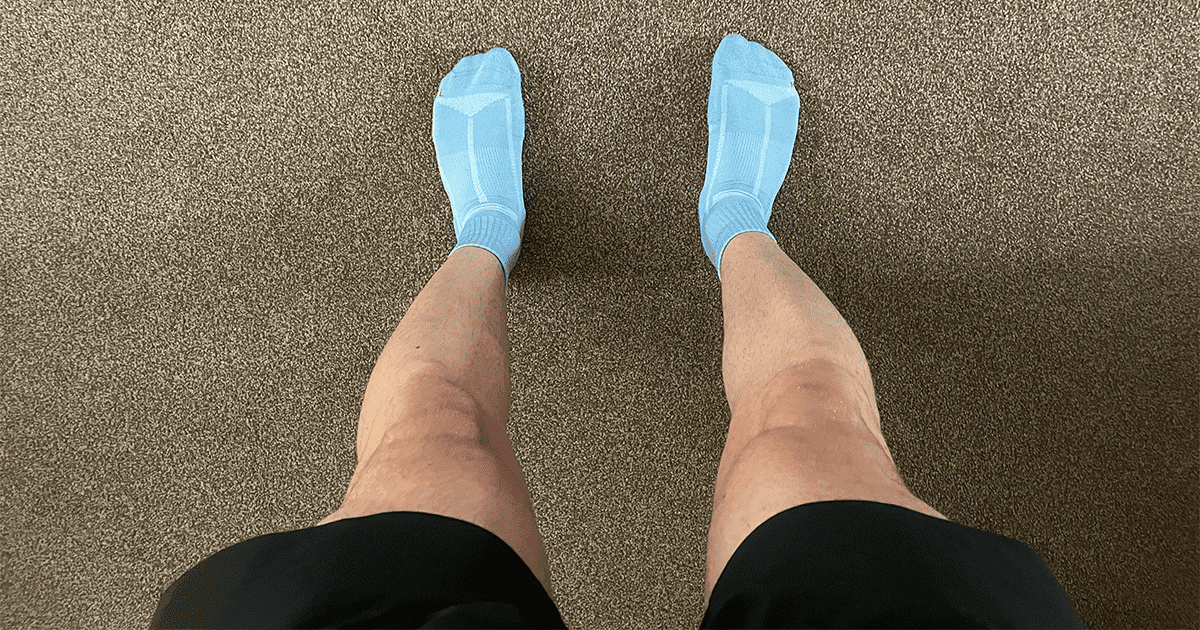10 Running tips for beginners to help you improve quickly
We provide you with ten tips to start running, helping you become a better runner in no time whatsoever.

There are many reasons for wanting to start running, whether you’re looking to shift a few extra pounds, want to be more active, have decided to focus on your health in 2021, or even just want to spend more time outside, preferably in the summer’s heat cranking out those miles.
However, although running may be a rather straightforward sport, many beginners don’t know where to start – they need a few tips to start running.
It may sound simple, but you’d be surprised how many people ‘think about running’ yet never actually do it. While it’s all good having them life-changing thoughts at 3 am while you can’t sleep, if you don’t take action you’ll never get anywhere – and you certainly won’t start running.
Related: 13 Popular running resolutions to choose from in 2021.
To help get your foot out the door for the first few times, and to help you get better, this article will provide you with ten running tips for beginners.
1. Just do it
The longer you spend researching, planning, and moping around ‘considering’ running, the more likely you are not to start. Instead, just start. Yes, it really is as simple as that. Get out the door and run for as long as you can. Whether you’re able to run five minutes or thirty minutes, making a start is the hardest part.

Consistency is key to progress
The more you run, the better you’ll get and the more you’ll enjoy it. It may not seem like it at the time, however, rest assured knowing you will see results in as little as a week or two of consistent running as a beginner.
For some reason, many of us are convinced that building habits take a total of twenty-one days. However, this is in fact a myth! A study back in 2009 found that instead of three weeks, it may take anywhere between eighteen and two hundred and fifty-four days for a person to build a new habit. However, it isn’t all bad news – the same study also observed that on average, it took sixty-six days for a new behaviour to become habitual.
While we’re not trying to dishearten you, you should know that habits such as ‘becoming a runner’ will not form overnight – they require hard work and dedication. Despite this, we can offer our biased opinion that you’ll fall in love with running in no time whatsoever, not even needing to build a habit!
2. Adopt the run/walk method
One of the more popular running tips for beginners is the run/walk method. This approach is especially popular for those unable to run for a substantial amount of time, whether this is ten or twenty minutes. To start the run/walk method:
• Perform a 5-minute warmup of dynamic stretching and walking
• Run for a set amount of time and then walk for a set amount of time
• Overtime gradually decrease the walking and increase the running
• Push yourself hard during the run section
• Gather your breath in the walking section
• Once finished, perform a 5-minute cool-down with static stretching and more walking
[click_to_tweet tweet=”Have you tried the run/walk method to start running? It’s easy to follow and great for building up your fitness! #running #running101 #runwalk #fitness” quote=”Have you tried the run/walk method to start running? It’s easy to follow and great for building up your fitness! #running #running101 #runwalk #fitness” theme=”style3″]3. Progress slowly, there’s no need to rush into it
Whether choosing to run or run and walk, progressing at a slow rate is essential when it comes to reducing your risk of injury. As a general rule of thumb: increase your total time spent running or weekly mileage by no more than ten per cent each week. For example, if last week you ran twenty miles, the following week you’d want to run no more than twenty-two.
Furthermore, ensure to include multiple rest-days per week into your training, especially when starting out. It’s easy to get carried away with training when as a beginner, so ensure to take it easy on your ‘easy days,’ even when you feel you have more gas in the tank. If you don’t hold back, this will further increase your risk of both overtraining and picking up an injury.
Related: A 10-step approach to recovering from injury.
4. Incorporate strength training into your schedule

Incorporate one or two strength sessions per week to take your running to the next level
Incorporating strength training into your schedule at least once per week will reduce your risk of injury and actually progress your running much faster. However, strength training should complement your running, not replace it. Too much strength training will likely impact the quality of your running, while also increasing your risk of injury.
Before beginning strength training for the very first time, you want to familiarise yourself with some basic exercises (more on this shortly) as well as focusing more on good form instead of the amount of weight you can lift.
1. Weighted walking lunges (3 sets of 10 reps)
2. Weighted/bodyweight Squats (3 sets of 10 reps)
3. Plank (3 sets of 60s)
4. Russian twists (3 sets of 45s each side)
5. Push-ups (3 sets to failure)
Strength training is one of the best running tips for beginners we can give you. Yet so many runners neglect the weights room or refuse to do push-ups as they’re afraid they’ll become too muscular. This is not true. So long as you stick to one or two strength sessions a week and do not eat in an enormous calorie surplus, you’ll remain the same build, perhaps a slight bit leaner.
5. Take care of your body
If you’re a total beginner to exercise or running, it is vital to take care of your body. This is due to the increased demand and stress you’re placing on your joints – you must take good care of yourself.
Think of yourself as a car – you can drive for miles, but eventually, you’ll run out of gas or worse require servicing. Don’t let your body reach that stage. Be sure to fuel your body with nutritious food including a mix of carbohydrates, vegetables, and plenty of protein, while also hitting the hay for a minimum of eight hours per night.
6. Celebrate even the smallest of victories!

From Netflix to putting off your chores, celebrate from time to time to appreciate how far you've come.
As a beginner runner, it’s important to celebrate each and every victory, no matter how big or small. Doing so increases your motivation for training and will most likely contribute to efforts that will help you become an overall better runner. It takes time, but it’s worth it, so remain patient.
To provide an example, these victories can be as simple as running on a day when you really don’t want to or running half a mile further than you’ve ever run before.
Ways in which you could celebrate include:
- Watching your favourite movie
- Rewarding yourself with something sweet
- Eating your favourite meal
- Not having to do the chores until tomorrow!
With this being said, you should only celebrate and reward yourself when you actually achieve something. That means no reward for sitting on the sofa binge-watching the Queen’s Gambit, despite how good it may be! Otherwise, you’ll begin to trick your mind into thinking you don’t need to run and can in fact have these rewards without running, consequently derailing your running progress.
Related: 6 Top tips for sticking with a training plan.
7. Plan ahead of time!
If you struggle with accountability or don’t know when you’ll squeeze in a quick run or two, you should begin planning ahead of time. Each Sunday, map out your week for both work, family, and other commitments. From here, pick the days you will train and what time you’ll train on these days.
To further increase accountability, share your schedule with a partner, friend, or family member. This way, you’re more likely to stick to it.
8. Make it social and meet up with friends
As mentioned previously, accountability is the name of the game. The more consistent you are with the training, the quicker you’ll improve as a runner.
Meeting up with friends or a local running group is not only an excellent way to push yourself by encouraging friendly competition but also helps the miles go by much quicker. Running with a friend or group once a week gives you something to look forward to, further helping you to enjoy your running.
Recommended: 9 Tips to help a friend start running today.
9. Wearing the correct footwear makes a world of difference
If you’re running around in converse chasing a personal best, stop. Running in any shoes or trainers other than running shoes is impractical and significantly increases your risk of injury. Ideally, you should visit a running shop for a gait analysis (this is where your running form is analysed to determine the best shoes for you).
Ensure to break these new kicks in by wearing these around the house and for a couple of walks. This will prevent blisters and general discomfort.
Related: 5 Best waterproof trail running shoes for men in 2021.
10. Create or follow a training plan
Finally, our last running tip for beginners is to create or follow a training plan. Training with some structure helps you become faster by following set sessions and workouts. For instance, your weekly running schedule could include one long run, one faster effort, one easy run, and a strength session.
If already been running for quite some time and are looking to further improve, you can grab a copy of our free intermediate 5k training plan by signing up to our email list (you can find this on our home page, in the side bar, or at the bottom of this post).
To summarise our best running tips for beginners
There are hundreds of tips to start running out there. However, making the first step is the most difficult. We promise running gets easier over time. If you’re just starting out, try the run/walk method and follow a set training plan to see the best results.
Be sure to share our top ten running tips for beginners with your friends or family members who are looking to start or become a better runner!
Why not check out our blog post on the 10 best affordable beginner running products?
Running tips for beginners FAQ
Finally, we’ve gathered together frequently asked questions regarding running tips for beginners with answers to these below:
How long should you run as a beginner?
Aim to run anywhere between fifteen and thirty minutes. Over time, you can increase this. If you can't quite run for this duration just yet, implement walk breaks or build-up to this.
How can I run longer without getting tired?
To run further without getting tired, you need to train more, ideally with a mix of sessions such as long runs, tempo runs, and speed sessions. You will also get faster as a beginner just by remaining consistent.
How to start running when out of shape?
We recommend the run/walk method to start. Run for several minutes and then walk for the same amount of time. Repeat and slowly reduce your time spent walking and increase your time spent running.
How to start running at 40 or older?
Most importantly, you should be patient and consistent with your training. It's essential not to overtrain, so perhaps train fewer times a week (e.g. two or three times), but remain consistent with this overtime to see results.

Matthew is a lifelong runner, chief tester of all products, the founder of Running101, and freelance content writer for active brands. When he’s not writing, he enjoys lifting weights, cycling in the Lake District, and watching fast cars drive in circles on a Sunday. He also has a BA in sport, exercise and physical activity from the University of Durham.




